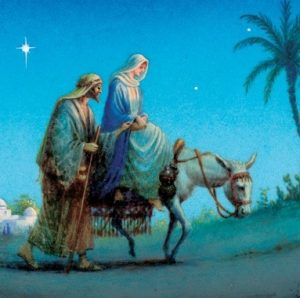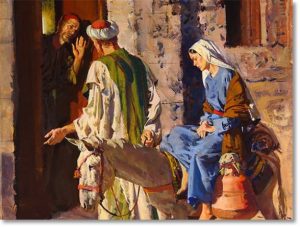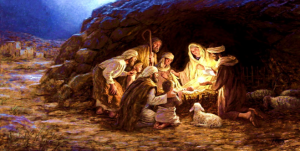…continuation of an extract from the Maria Legionis (The voice of the Legion of Mary) Edition 4 of 2018 on “Christmas” by Frank Duff. It was first published in Maria Legionis, December 1959 – February 1960.
The Road to Bethlehem.
But at this point something asserts itself, something which appears to be purely human but which was foreseen by the prophets seven hundred years before. The merciless power of Rome steps in and takes a hand in the game. The Emperor Augustus decreed a census of his empire. Of that dominion, the Holy Land had become part; because the sceptre, that is sovereignty, had departed from Judea. This was one of the signs specified by the prophets of the coming of the time of Our Lord: that Judea would have ceased to be independent.
The imperial decree proclaimed that all must register without exception and that each one should do so in the city of his tribe. Mary and Joseph were of the tribe of David. The central city of the tribe was that place, the name of which is now so wonderful, Bethlehem. And so to Bethlehem they prepared to go.
The distance to Bethlehem is 86 miles. The road goes through Jerusalem, and Jerusalem is six miles from Bethlehem. It was winter time. Contrary to what we might imagine, winter there is cold, and that could be severe. Probably there will be snow, and tradition clothes Bethlehem with snow on that great night. Here I remind you of the foretelling by Our Lord of the destruction of Jerusalem when He said: “Pray that your flight may not be in the winter time.” But He reserved that very fate for His most beloved, His mother. He did not spare her. Her destiny was part of His; it came out of His, just as His Body came out of hers.
That journey could have dangers as well as discomforts. The Bible is full of references to lions in Palestine. Leopards and bears and wolves lurked at that time in the caves and in the forest, particularly in the Valley of the Jordan. Night, of course, was their prowling time and the Holy Family would probably not then be abroad. In addition to the savage wild animals, there was a greater danger from the savage wild robbers, the brigands who then abounded.
While the Holy Family was not then unduly exposed to those kind of dangers, especially as there were crowds journeying by reason of the census, I point forward to the Flight into Egypt when they will have to face those perils in their grimmest form. Then they will be by themselves, moving by night, keeping away from the tracks that other travellers would follow, because they will be flying from the pursuing power of Herod.
The Search for Room.
It is reckoned that on the fourth or fifth day from Nazareth they would reach Jerusalem. Then they would of course hurry on to Bethlehem, which is the final short leg of the journey. They were days of immense fatigue, because Our Lady was not fit to travel. One old painting shows the scene. The little donkey bears that beloved woman. She is drooping; one arm is round Joseph’s neck as he walks beside her, supporting her. An angel is holding the bridle of the donkey and steering it on its way. The saddle is just a folded cloth. Contrary to the common custom of portraying him as older, Joseph would probably have been about thirty years old.
One old legend said Our Lord was born a little prematurely, so anxious was Our Lady to see His face. This might have a bearing upon the seeming catastrophe of the refusal of Bethlehem to accommodate the wayfarers. More than other women do, Mary knew her Babe should be born. She would not have deliberately placed that event in Bethlehem at the moment of great crowding. So it could be that Our Lord arrived a little sooner than expected.
We can imagine, and we read in some of the mystics too, of the anguished search through Bethlehem for accommodation. The position at the moment was that every member of the House of David was concentrated on that comparatively small town. Though they did not realise it, they were the playthings of a divine manoeuvre in being thus brought together. They were fulfilling their significant part in redemption. They were being assembled to be present at the birth of their greatest Child. The crowding of course was extreme. Imagine, for instance, what Cork would be like if every Cork man and woman had to return there for a day! We can see, too, that the exodus from the countryside, which we are so much deploring today, was a feature then as it is now. As Solomon declared: “There is nothing new under the sun.”
Bethlehem was – and I think continues to be – a place of about three thousand persons. It consisted of an amphitheatre in a valley surrounded by hills, the town nestling into the bosom of those hills. It is an extraordinary thing that although Bethlehem had innumerable advantages of a type that we would call tactical or strategic for warfare, it possesses no title to fame other than the fact that it brought forth King David who was born there, and later, He of Whom King David was the progenitor, the Prophet and the type, that is Our Lord. One thing which all travellers talk about and have talked about since that day has been the beauty of the women of Bethlehem. Some of the writers have not hesitated, probably with reason, to ascribe this to the blessing imparted to the place by her who was the most beautiful of them all. There was no room for them in the inn at Bethlehem! “He came unto His own and His own received Him not.”
First, they were seeking for ordinary accommodation, and in a little while they were seeking for any accommodation. Then they had to strike out further afield, and finally the celebrated stable was their sanctuary.
The Stable.
Let us beware of thinking that this stable was a wooden structure of the crib type. It was a dugout or cave. It was a shelter for sheep or oxen in bad weather. In that least of places, which Papini in his well-known ‘Life of Our Lord’ refers to as the dirtiest spot on earth, was born the Lord of the World. This series of frustrations and humiliations look fantastic, but it is not quite as bad as we are inclined to think it. There is no question whatever, I would say, of Our Lady being just ruthlessly turned away from doors.
Living was a simpler matter in those days. The traveller brought along a rug or blanket; found a little spot between two other people in any shelter or under some sort of roof; squeezed in and slept. It is most certain that Our Lady could have been provided for in that manner. But in her case, privacy was necessary, and Bethlehem was like a tin of sardines on that night.
But the amazing, the providential, fact is that alone in all that land the Holy Family was unable to find a corner. Even on that night of over-crowding, not one other person was relegated to that stable. However, they had in it the privacy that they needed; privacy reserved to themselves alone.
It was not the picturesque haven shown by the cribs, with fragrant straw and a nice cradle-like manger. The reality was very different. It is described by St. Jerome as being little better than a hole in the ground, and he should know because he lived in it for thirty years when he was translating the Bible into Latin. The place was the refuge of animals. We can imagine the rest. It was piercingly cold that night and miserably dark. How did they give themselves a light? We must assume that Joseph had a lantern.
One author tells us something that we would not have thought out for ourselves but which must have been the case. It is that in that abode were swarms of vermin and that these would at once rush to welcome anything warm and offering nourishment. Thus the new-born Child was destined to shed His blood the moment He was born. Contemplate the distress of the mother, helpless to save Him from this terrible affliction! Thus did Mary bring forth her Son and by the instruction of Gabriel call His name “Jesus” because He would save the people from their sins. (to be continued)





